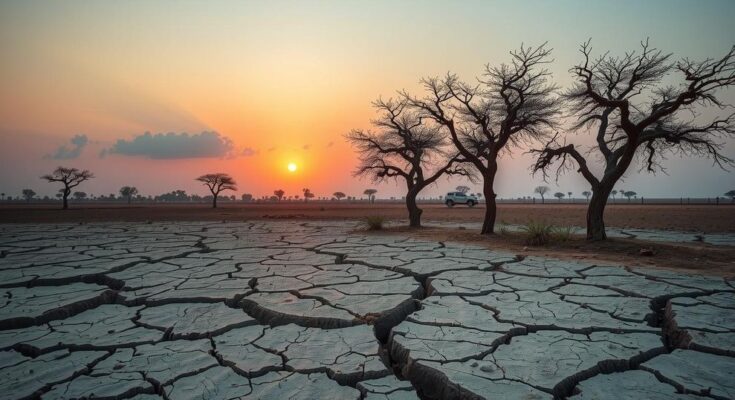Africa, contributing merely 4% of global emissions, faces severe consequences from climate change, including economic losses and food insecurity. The financial burden of adaptation is beyond the capacity of many nations, compounded by political instability and corruption. Addressing internal governance issues alongside external financial support is crucial for effective climate action in Africa.
Africa faces the harsh realities of climate change despite being a negligible contributor to the issue, accounting for only 4% of global carbon emissions. The continent is grappling with significant development challenges, such as high poverty rates, underdeveloped technology, and increasing youth populations. Yet, it is projected to bear the brunt of climate impacts, which have already begun affecting agricultural productivity, resulting in losses of 2-5% of GDP annually. Countries like Nigeria express commitment to climate action but struggle to balance developmental needs with environmental responsibilities.
The economic burden of adapting to climate change is extensive, estimated at $30 billion to $50 billion yearly, far beyond the capacity of many African nations. While Africa possesses rich natural resources, it only received $53 billion in foreign investment, representing a meager 4% of the global total. Additionally, domestic challenges such as political instability and corrupt governance impede progress and international support for climate action, resulting in a disconnect between potential and reality.
Recent youth-led protests across Africa reflect growing discontent with governance issues tied to economic mismanagement and unmet expectations. As highlighted by Sir Mo Ibrahim, this unrest is fueled by a lack of opportunities for young people who increasingly demand accountability. Furthermore, regional instability has escalated in parts of West Africa, exacerbating the continent’s vulnerabilities amidst climate challenges.
Political dysfunction remains a critical barrier for effective climate response, as weak institutions prevent mobilization of resources and hinder progress. Developed nations have pledged funds to support climate action in Africa; however, these commitments have frequently fallen short. In 2022, climate financing reached approximately $115 billion, yet Africa’s needs surpass available resources, necessitating an annual investment of nearly $580 billion for adaptation and mitigation measures.
Moreover, corruption siphons off approximately $148 billion each year, undermining efforts to strengthen climate resilience. To combat these issues, Africa must enhance governance practices and transparency, essential to ensuring resources are effectively allocated. Emphasizing climate-smart agricultural techniques and investing in renewable energy are also vital steps toward reducing reliance on fossil fuels and enhancing food security.
Ultimately, Africa’s path to resilience lies in both addressing the external ramifications of climate change and reforming internal governance structures. Without a clear strategy and commitment to reforms, Africa remains on the precipice of becoming the world’s most affected region due to climate change, despite being a minimal contributor to the problem.
The article discusses the disproportionate impact of climate change on Africa, a continent that contributes minimally to the global carbon emissions that drive this crisis. Despite its rich natural resources, Africa struggles with socio-economic challenges exacerbated by the effects of climate impacts. The piece highlights the urgent need for substantial climate financing and reform in governance to enable effective adaptation and management of these environmental crises. The text further emphasizes the role of youth protests and political unrest in revealing the disconnect between the continent’s potential and the realities faced by its populace.
In conclusion, Africa stands at a critical juncture, facing the deleterious effects of climate change while being ill-equipped to combat them due to internal governance issues and external financial shortfalls. To mitigate these challenges, it is vital for African nations to foster strong institutions, enhance transparency, and implement climate-sensitive practices. Only with both external support and internal reform can Africa hope to manage the climate crisis effectively and secure a sustainable future for its emerging generations.
Original Source: businessday.ng




